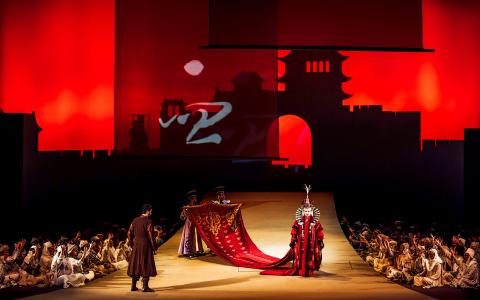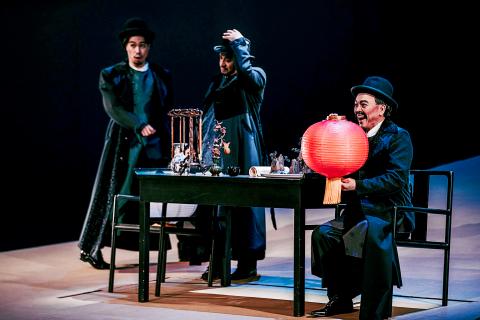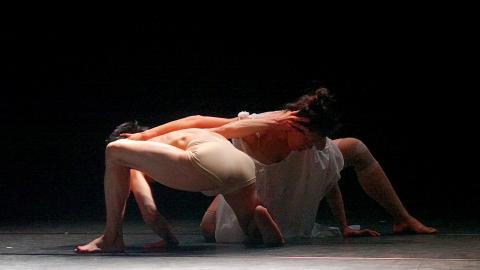The National Kaohsiung Center for the Arts (Weiwuying)-Deutsche Oper am Rhein production of Giacomo Puccini’s Turandot premiered in Germany in December 2015, but its Taiwan premiere was delayed until last week due to Weiwuying not opening until October last year.
So great was the anticipation for the Taiwanese-helmed production that when tickets for the three performances went on sale late last year they sold out fast — even though Weiwuying’s Opera House has 2,236 seats. The theater added a fourth show, which also sold out.
Director Li Huan-hsiung (黎煥雄) and his creative team made several brave choices for this production that paid off, while the predominately Taiwanese cast on Friday night last week, led by Hanying Tso-Petanaj (左涵瀛) in the title role, were terrific.

Photo courtesy of the National Kaohsiung Center for the Arts
Li’s Turandot is a stunner, from stage designer Liang Jo-shan’s (梁若珊) minimalist set, to Lai Hsuan-wu’s (賴宣吾) costumes — which were all made by the Deutsche Oper am Rhein’s costume shop — to the projections of video designer Wang Jun-jieh (王俊傑).
I don’t think I have ever heard the Evergreen Symphony Orchestra (長榮交響樂團), conducted by Weiwuying artistic director Chien Wen-pin (簡文彬), and beefed up with musicians from the Kaohsiung City Wind Orchestra (高雄市管樂團), sound so good.
Some of Li’s choices were bound to be controversial, beginning with his decision to stage the opera as a dream, or actually more nightmare, of a modern Chinese woman — white-clad dancer Yu Cheng-jung (余承蓉) — who drifts in and out of the action and sometimes becomes a player.

Photo courtesy of the National Kaohsiung Center for the Arts
The opening scene behind a scrim evokes Hong Kong’s 2014 Umbrella protests: the chorus huddles under black umbrellas while black-clad helmeted riot police stand behind their shields along the ramparts of a silhouette of a Chinese walled city, with the message “Cease or we open fire” emblazoned over the archway.
Emperor Altoum was sung by Chang Yuh-yin (張玉胤), Timur by South Korean basso Taihwan Park, Calaf by Italian tenor Dario Di Vietri, Liu by Taiwanese soprano Lin Ling-hui (林玲慧), with Singaporean baritone Martin Ng (吳翰衛) as Ping, Taiwanese Amis tenor Claude Lin (林健吉) as Pang, Taiwanese-American tenor Joseph Hu (胡中良) as Pong and Taiwanese baritone Rios Li (李增銘) as the Mandarin.
Tso-Petanaj and Lin Ling-hui were just as stunning as they had been in the National Symphony Orchestra’s (NSO, 國立臺灣交響樂團) production of Puccini’s Il Trittico in July 2017.

Photo courtesy of Bare Feet Dance Theatre
While I was not initially impressed by Di Vietri, by the time Calaf’s famous aria Nessun Dorma rolled around in Act Three he had hit his stride.
I was also impressed by Ng, whose portrayal of Scarpia in the NSO’s concert version of Tosca in February at the National Concert Hall in Taipei was stiff. As Ping, the lord chancellor, he was much more animated, not to mention funny.
Lai’s costume were an interesting design mix, ranging from a mix of ethnicities in Yuan Dynasty China — Han, Muslims, Mongolians and Tibetans — to magnificent robes for Turandot. He dressed the emperor in a suit and bowler hat like Puccini used to wear, while Ping, Pang and Pong shifted between Yuan-like court robes and 19th century Western suits, much as the stage imagery shifted between ancient China and modern-day Asia.
However, the best thing about Weiwuying’s production of Turandot is that it will not disappear like a dream once the night is over, the way most of the major international shows coproduced by the National Theater have done.
Chien said Weiwuying is going to build a repertoire of works that it will perform regularly, starting with Turandot.
On Saturday night in the National Experimental Theater in Taipei, I was faced with the same conundrum as the previous weekend in main theater: How to reconcile a choreographer’s stated intention with what was presented on stage.
While Christian Rizzo’s une maison, performed by France’s International Choreographic Institute-CCN as part of the Taiwan International Festival of Arts, ended up being more than the sum of its parts and quite enjoyable, Bare Feet Dance Theatre’s (壞鞋子舞蹈劇場) An Eternity Before and After (渺生) began to feel more like an endless academic exercise of interest only to kinesiologists.
Artistic director and choreographer Lin I-chin’s (林宜瑾) idea was to have her dancers build and accumulate energy before it is depleted and weakens into the start of another cycle.
An Eternity Before and After turned out to be an endurance test for audience members, for dancers Panay Pan and Liu Chun-te (劉俊德), and for their simple white sleeveless shift dresses by designer Erichoalic (蔡浩天).
It was also a race against time to see which would collapse first: the two dancers, who were pushing their bodies to the limits in a 50-minute work where they basically never stopped moving or their costumes, which, as they became plastered by sweat to the pair’s torsos and legs, began to break apart and dissolve.
The piece begins with new media artist Chuang Chih-wei’s (莊志維) installation work: nine interconnected silver rods of differing lengths, clinking on the floor in the darkness as they were tugged by lines running from the grid loft overhead.
As the rods were pulled toward the ceiling, Pan and Liu appeared as dim ghostly shapes in the dark, swaying almost imperceptibly in place in the center. As the lighting brightened, their movements slowly became more pronounced, rocking gently, arms swinging back and forth, the minimalist moves becoming more rhythmic, more expansive, only to start contracting and declining, again and again and again to an electro-tech soundtrack by Lee Tzu-mei (李慈湄).
The pair’s movements were interdependent, yet they moved independently for most of the show, their efforts completely internalized. When they did start to touch, they were not so much joining together as clinging on for support.
Just when you think they could not possibly have any energy left, they began to move in even more exaggerated motions and at a faster pace, as Chuang’s rods spun and dipped over their heads.
One has to admire the dancers’ commitment and stamina, and Liu’s effort to get her audiences to appreciate motion for its own sake, but An Eternity Before and After is a challenge to watch, and makes little effort to connect with its audiences.

US President Donald Trump may have hoped for an impromptu talk with his old friend Kim Jong-un during a recent trip to Asia, but analysts say the increasingly emboldened North Korean despot had few good reasons to join the photo-op. Trump sent repeated overtures to Kim during his barnstorming tour of Asia, saying he was “100 percent” open to a meeting and even bucking decades of US policy by conceding that North Korea was “sort of a nuclear power.” But Pyongyang kept mum on the invitation, instead firing off missiles and sending its foreign minister to Russia and Belarus, with whom it

Many people noticed the flood of pro-China propaganda across a number of venues in recent weeks that looks like a coordinated assault on US Taiwan policy. It does look like an effort intended to influence the US before the meeting between US President Donald Trump and Chinese dictator Xi Jinping (習近平) over the weekend. Jennifer Kavanagh’s piece in the New York Times in September appears to be the opening strike of the current campaign. She followed up last week in the Lowy Interpreter, blaming the US for causing the PRC to escalate in the Philippines and Taiwan, saying that as

When Taiwan was battered by storms this summer, the only crumb of comfort I could take was knowing that some advice I’d drafted several weeks earlier had been correct. Regarding the Southern Cross-Island Highway (南橫公路), a spectacular high-elevation route connecting Taiwan’s southwest with the country’s southeast, I’d written: “The precarious existence of this road cannot be overstated; those hoping to drive or ride all the way across should have a backup plan.” As this article was going to press, the middle section of the highway, between Meishankou (梅山口) in Kaohsiung and Siangyang (向陽) in Taitung County, was still closed to outsiders

The Chinese Communist Party (CCP) has a dystopian, radical and dangerous conception of itself. Few are aware of this very fundamental difference between how they view power and how the rest of the world does. Even those of us who have lived in China sometimes fall back into the trap of viewing it through the lens of the power relationships common throughout the rest of the world, instead of understanding the CCP as it conceives of itself. Broadly speaking, the concepts of the people, race, culture, civilization, nation, government and religion are separate, though often overlapping and intertwined. A government